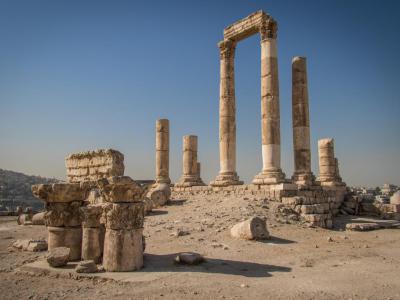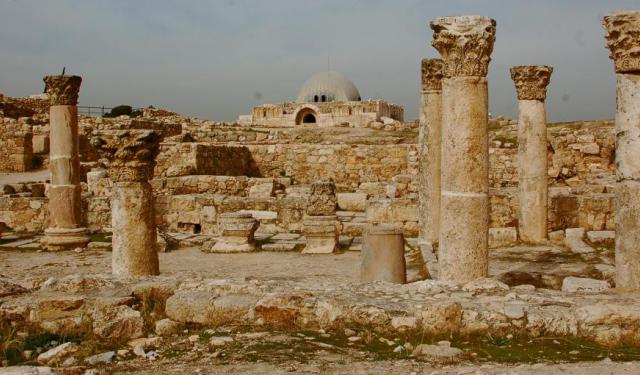Temple of Hercules, Amman
The Temple of Hercules is hailed as one of the most significant Roman structures nestled within the Amman Citadel, echoing the city's rich history and architectural grandeur.
Historical records suggest that the construction of the Temple of Hercules can be attributed to the reign of Geminius Marcianus, who held the position of governor of the Province of Arabia during the years AD 162–166. This timeline places the temple's creation in parallel with another iconic Roman marvel in Amman, the Roman Theater.
The temple's footprint measures approximately 30 by 24 meters (98 by 79 feet), while the outer sanctum encompasses a vast area measuring 121 by 72 meters (397 by 236 feet). An imposing portico, graced by six majestic columns standing at an impressive height of approximately 10 meters (33 feet), welcomes visitors to this historical treasure.
As historians and archaeologists delve into the temple's past, they believe that the absence of additional columns hints at an unfinished construction. It is speculated that the marble intended for completing the temple may have been repurposed for the nearby Byzantine Church, further adding to the historical intrigue of the site.
One of the most captivating features of the Temple of Hercules is the discovery of fragments belonging to a colossal statue, unmistakably identified as Hercules himself. This imposing figure is estimated to have once stood tall, soaring over 12 meters (39 feet) in height. Regrettably, the ravages of time, possibly exacerbated by seismic activity, have left us with only remnants, including three fingers and an elbow, as hauntingly beautiful reminders of the past.
Historical records suggest that the construction of the Temple of Hercules can be attributed to the reign of Geminius Marcianus, who held the position of governor of the Province of Arabia during the years AD 162–166. This timeline places the temple's creation in parallel with another iconic Roman marvel in Amman, the Roman Theater.
The temple's footprint measures approximately 30 by 24 meters (98 by 79 feet), while the outer sanctum encompasses a vast area measuring 121 by 72 meters (397 by 236 feet). An imposing portico, graced by six majestic columns standing at an impressive height of approximately 10 meters (33 feet), welcomes visitors to this historical treasure.
As historians and archaeologists delve into the temple's past, they believe that the absence of additional columns hints at an unfinished construction. It is speculated that the marble intended for completing the temple may have been repurposed for the nearby Byzantine Church, further adding to the historical intrigue of the site.
One of the most captivating features of the Temple of Hercules is the discovery of fragments belonging to a colossal statue, unmistakably identified as Hercules himself. This imposing figure is estimated to have once stood tall, soaring over 12 meters (39 feet) in height. Regrettably, the ravages of time, possibly exacerbated by seismic activity, have left us with only remnants, including three fingers and an elbow, as hauntingly beautiful reminders of the past.
Want to visit this sight? Check out these Self-Guided Walking Tours in Amman. Alternatively, you can download the mobile app "GPSmyCity: Walks in 1K+ Cities" from Apple App Store or Google Play Store. The app turns your mobile device to a personal tour guide and it works offline, so no data plan is needed when traveling abroad.
Temple of Hercules on Map
Sight Name: Temple of Hercules
Sight Location: Amman, Jordan (See walking tours in Amman)
Sight Type: Attraction/Landmark
Guide(s) Containing This Sight:
Sight Location: Amman, Jordan (See walking tours in Amman)
Sight Type: Attraction/Landmark
Guide(s) Containing This Sight:
Walking Tours in Amman, Jordan
Create Your Own Walk in Amman
Creating your own self-guided walk in Amman is easy and fun. Choose the city attractions that you want to see and a walk route map will be created just for you. You can even set your hotel as the start point of the walk.
Amman Introduction Walking Tour
The capital of Jordan, Amman, is a city that successfully marries rich history with the bustling vibrancy of a modern metropolis. A place where ancient tales and contemporary life intersect.
The earliest evidence of human settlement in the area dates back to the 8th millennium BC. Initially, in the second millennium BC, the city was known as Rabat Aman and served as the capital of the Ammonite... view more
Tour Duration: 2 Hour(s)
Travel Distance: 4.3 Km or 2.7 Miles
The earliest evidence of human settlement in the area dates back to the 8th millennium BC. Initially, in the second millennium BC, the city was known as Rabat Aman and served as the capital of the Ammonite... view more
Tour Duration: 2 Hour(s)
Travel Distance: 4.3 Km or 2.7 Miles
Roman Ruins Walking Tour
Once dominated by the Romans, the modern-day Jordanian capital, Amman, still boasts that legacy. The area known as the Citadel, sitting on the highest hill in Amman, Jebel Al Qala’a, some 850 meters above sea level, offers plenty to see.
Perched atop the Citadel, the Umayyad Palace is a captivating sight. Dating back to the 8th century, it showcases intricate Islamic architecture and affords... view more
Tour Duration: 2 Hour(s)
Travel Distance: 3.0 Km or 1.9 Miles
Perched atop the Citadel, the Umayyad Palace is a captivating sight. Dating back to the 8th century, it showcases intricate Islamic architecture and affords... view more
Tour Duration: 2 Hour(s)
Travel Distance: 3.0 Km or 1.9 Miles





